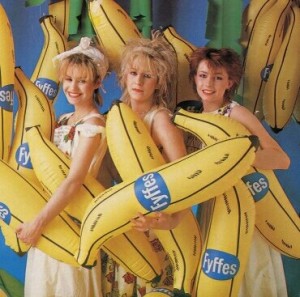“The Knickerbocker Glory Years” is Martin Lampen’s hilarious homage to all that is awful in British food. From A – All You Can Eat £5.99 to Z – Zest, the book lays out the dark side of British cooking.
I really liked this book. Lampen’s humour is of the very dry British style. If you do not like my excerpts you will probably not like the rest of the book. If you do like them, try to hunt down this book as you will thoroughly enjoy the rest of it. Also, the same book is called “Sausage in A Basket” in some parts of the world.
Many of the entries are short. For instance, the entry for Wood Fired Pizza is:
“Big Fucking Deal”
The longest entry is 13 pages and documents Lampen’s first dinner party in all it’s excruciating awkwardness. This is the type of book you can dip in and dip out of as you require, it doesn’t have to be read from cover to cover.
Given that I touched on the 1970’s fondness for Ham Steak and Pineapple in the last post, Lampen’s take on Gammon is:
“The pig is slaughtered, its hind legs are removed, cured, glazed in honey and sliced into steaks. If this isn’t indignity enough, the steaks are then topped with a single wet pineapple ring from a dented tin and a waxy maraschino cherry.
Yes, gammon steak when topped with egg or pineapple is a peculiarly British dish: a bloated pink slab of fatty meat, topped with a garish fruit hat. Rather like a ‘Nikita’-era Elton John”
On the subject of pineapple, the entry for Tropical is:
“In Britain, any food or drink – be it a concentrated juice, cordial or sugary carbonated fizz – containing lemon, lime, pineapple or mango is tagged as ‘tropical’.
It’s important to note that other items included in the taxonomy ‘tropical’ are tuberculosis, typhoid, tularemia, (and) tropical storm Arlene”
Or, this for Guacamole:
“A filthy Soylent Green-style dip, guacamole is usually served with stale Doritos, a mountain of melted Cheddar cheese and mayonnaise on chain-pub’s nacho platter . It’s made from dead people.”
As for the eponymous Knickerbocker Glory Lampen has this to say:
“The knickerbocker glory, a layered dessert served in a tall glass and made with ice cream, tinned peaches, chocolate or fruit sauce and strawberry puree was the first post war dessert to be made in Britain that did not contain suet.
For a young male aged between eight and fourteen in the 1980’s, the knickerbocker glory was the greatest sensual experience one could imagine. Greater even than being interfered with by Bananarama”
For those of you who have no idea what Bananarama is, firstly it was a they and they were an immensely popular girl band of the 1980’s.
In homage to this book I made my own Knickerbocker Glory and it was about the funnest thing I have eaten all year!!! And I know full well funnest isn’t a word, but it was so much fun I lost all thoughts about grammar.
My version of Knickerbocker Glory differs from Lampen’s in that I always thought Knickerbocker Glory should contain jelly. My version contained the following layers:
- Strawberry jelly (Jello)
- Vanilla ice cream
- Chocolate cookie crumbs
- Sliced Banana
- Strawberry Jelly
- Strawberry Ice-cream
- Frangelico Fudge Sauce (Recipe follows or you could just use your preferred chocolate sauce)
- Chopped nuts
- Rosewater & Almond Tuile (Recipe follows or you could use a bought wafer)
- Strawberry Garnish
For something that is largely put together from bits and pieces, this looks spectacular! And tastes even better!!!
Enjoy!
Recipes:
Frangelico Fudge Sauce
This makes 6 cups, you can obviously adjust quantities down if you do not want this much. This is so easy to make and absolutely delicious!
1 litre cream
250g dark chocolate
200g marshmallows
Frangelico to taste
- Heat the cream, chocolate and marshmallows slowly until melted and well combined.
- Stir in Frangelico to taste.
Almond and Rosewater Tuiles
These are a little troublesome to make but are worth it in the end!
50g caster sugar
30g unsalted butter at room temperature, plus extra for greasing
1 egg-white
1/4 tsp rosewater
Finely grated rind of 1/2 an orange
35g plain flower
30g flaked almonds
pinch of salt
- Make a template by drawing a triangle, circle or any shape you want on a plastic lid or a sheet of firm plastic, then cut the shape out. The shape should be no larger than 5cm in diameter. Set the template aside.
- Beat sugar and butter with an electric beater until pale and creamy. Add eggwhite and beat on lowest speed until incorporated.
- Add rosewater, orange rind, flour and a pinch of salt. Mix lightly until combined, then refrigerate for 1 hour to rest. (The batter will keep in the fridge for 2-3 days.
- Preheat oven to 180°. Place template on a baking paper lined tray, add a teaspoon of the batter into the template and spread the mixture with an offset palette knife so that it fills the template in a thin even layer.
- Repeat until the baking tray is full. Scatter almond flakes over each until tuiles are golden brown on the edges (8-10) minutes. While still warm you can shape around a rolling-pin if desired or cool on tray and carefully remove.
- Repeat with remaining batter.
- Tuiles will keep in an airtight container for 3 days.













